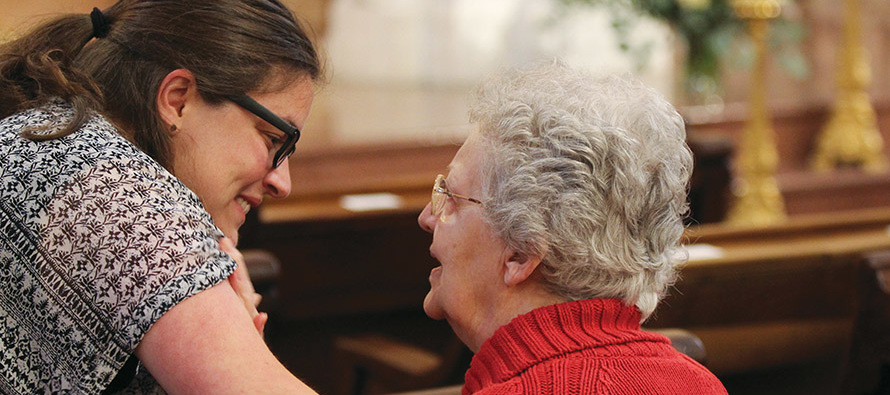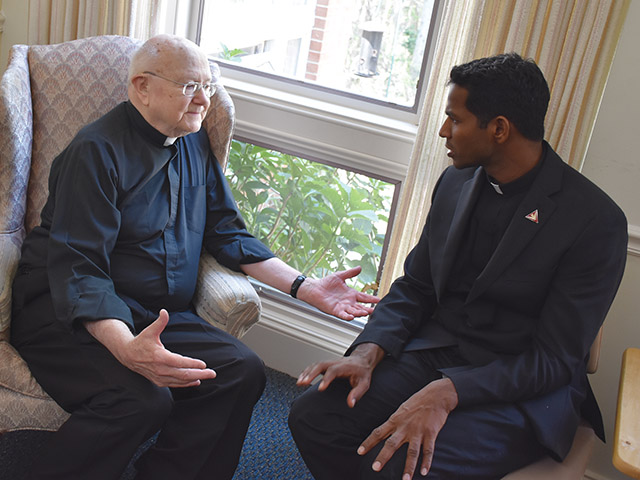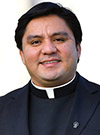Community life: A place to call home

Having people who support you in good times and bad is one of the beautiful parts of religious community life. Here, Sister Emily TeKolste, S.P. (left) greets Sister Barbara Doherty, S.P. (Photo: Courtesy of Sisters of Providence of Saint-Mary-of-the-Woods)
THE TOPIC of religious community is both interesting and challenging. Since our creation, God designed humankind to be relational. None of us were intended to live the Christian life alone. Scripture calls us to love one another as Jesus loves us. It, therefore, challenges us to commit ourselves to life together as the People of God.
Religious communities of Christians living together are one way of following the mind of God. Religious communities are meant to be gifts of God, offering those who enter them the opportunity to live a rich and demanding life together. They provide a path for sharing with all people our common life in Christ.
The church finds the ultimate source of its life and action in the Most Holy Trinity, three persons, Father, Son and Spirit, existing with one mind and heart, bonded together by unlimited love. God wishes us to live and enjoy that love also. The Father, Son, and Spirit give themselves to us, too, so that we might love one another as they love one another. Jesus shows us that love and continues to lead us.
As religious, each of us expresses that love as we share our common life in our varied religious congregations. We live together, pray together, and do ministry together. Despite our differences and challenges, we strive to grow in holiness through friendship and fraternity, serving the People of God as we support one another.
Brothers who are there for me
For me, a religious community is where I can feel supported in ministry. Whenever I feel down or have any kind of struggles in my ministry, my brothers in the community are always there for me.
Let us now look at the New Testament, particularly at the Acts of the Apostles. There we find a description of what community is and why it is important to live community well.
They devoted themselves to the teaching of the apostles and to the communal life, to the breaking of the bread and to the prayers. Awe came upon everyone, and many wonders and signs were done through the apostles. All who believed were together and had all things in common; they would sell their property and possessions and divide them among all according to each one’s need (Acts 2:42-45).
This passage is a small portion of a whole chapter that shows what community life looked like in the first Christian communities. It shows that they were very docile to the movement of the Holy Spirit.
For centuries religious communities of men and women have turned to these narratives in the Acts of the Apostles for a model of what it means to live in community. Common life gives us the opportunity to live with people committed to the same mission and charism—a group of brothers or sisters who will support, encourage, and love us in any circumstance. In community we know that whatever difficulties we have, we experience them together in Christ.
The 1994 Vatican document Congregavit nos in unum Christi amor (Fraternal Life in Community) states: “Within a truly fraternal community, each member has a sense of co-responsibility for the faithfulness of the others; each one contributes to a serene climate of sharing life, of understanding, and of mutual help, each is attentive to the moments of fatigue, suffering, isolation, or lack of motivation in others; each offers support to those who are saddened by difficulties and trials.”

Failures, yes, but reconciliation, too
From my own experience, after living in community for some years, I can say how blessed I am to belong to the Vincentian community of priests and brothers. My community has become a place where I feel loved, accepted, and supported. It is also a place where I can experience healing. If I fail, my mistakes can be redeemed. If I am wounded by life, I will always have someone to be there for me.
Let me finish by listing four values for living in community taken from canon law:
1. The community becomes a mutual support for all.
2. We are united as a special family in Christ.
3. By communion as brothers and sisters we are rooted and founded in charity.
4. As members of a community we are called to be an example of the universal reconciliation given us in Christ.
Know that whoever you are, as you read this article to better understand religious community life and continue your discernment, you will be in my prayers. God calls us each by name, and the Christian journey is meant to be lived together. How will you live your Christian calling?
A version of this article first appeared as a presentation in the NRVC webinar series “Religious Life Today: Learn it! Love it! Live it!” Find more about the series here: nrvc.net/webinars.
Related article: VocationNetwork.org, “Living the good life in community.”
Tags
Related
- Questions you’ll be glad you asked
- What monastic mystics got right about life
- Religious communities embrace diverse members
- How my parents responded when I became a brother
- Vocation Basics: You are already called—Message to youth from Pope Francis
- Meet the parents
- Charism: The gift that shapes lives
- What our vows mean
- Discover five treasures of religious life
- Religious making a difference Read More
Most Viewed
- Find your spirituality type quiz
- Questions and answers about religious vocations
- Celibacy quiz: Could I be a nun? Could I be a brother? Could I be a priest?
- Resources for older discerners or those with physical and developmental differences
- About Vocation Network and VISION Guide


